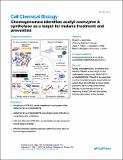Chemogenomics identifies acetyl-coenzyme A synthetase as a target for malaria treatment and prevention
Author(s)
Pasaje, Charisse Flerida A; Niles, Jacquin
DownloadPublished version (2.874Mb)
Publisher with Creative Commons License
Publisher with Creative Commons License
Creative Commons Attribution
Terms of use
Metadata
Show full item recordAbstract
We identify the Plasmodium falciparum acetyl-coenzyme A synthetase (PfAcAS) as a druggable target, using genetic and chemical validation. In vitro evolution of resistance with two antiplasmodial drug-like compounds (MMV019721 and MMV084978) selects for mutations in PfAcAS. Metabolic profiling of compound-treated parasites reveals changes in acetyl-CoA levels for both compounds. Genome editing confirms that mutations in PfAcAS are sufficient to confer resistance. Knockdown studies demonstrate that PfAcAS is essential for asexual growth, and partial knockdown induces hypersensitivity to both compounds. In vitro biochemical assays using recombinantly expressed PfAcAS validates that MMV019721 and MMV084978 directly inhibit the enzyme by preventing CoA and acetate binding, respectively. Immunolocalization studies reveal that PfAcAS is primarily localized to the nucleus. Functional studies demonstrate inhibition of histone acetylation in compound-treated wild-type, but not in resistant parasites. Our findings identify and validate PfAcAS as an essential, druggable target involved in the epigenetic regulation of gene expression.
Date issued
2021-08Department
Massachusetts Institute of Technology. Department of Biological EngineeringJournal
Cell Chemical Biology
Publisher
Elsevier BV